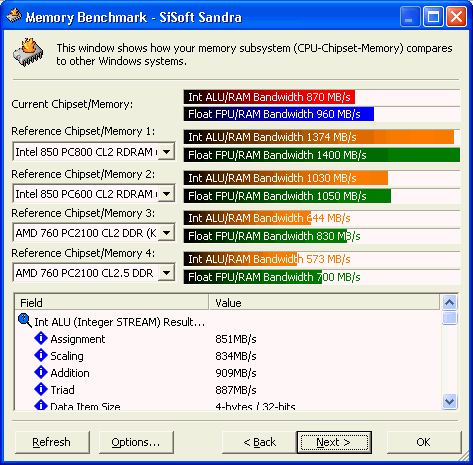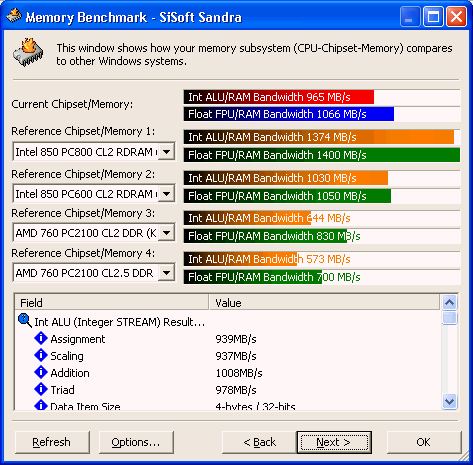OCZ CL2 PC2400 DDR Review
When I recently swapped out my Athlon 1.4 GHz chip for one of the new
AthlonXP 1800+ CPU's, I was expecting more of a speed increase then what I did
get. No biggie, after all, the XP is really only 133 MHz higher then my old
chip. Little did I know, AXP's really need a DDR setup!
While reviewing the MSI K7T266Pro2-Ru and using my AXP1800+, the performance
gain was quite incredible! Anyway, I'm concluding that equipping an AXP CPU with
a SDR setup is ALMOST (but not quite) as bad as using a P4 and
SDRAM. 
Because of the
K7T266Pro2's lack of bus speed, I decided to use the EpoX 8KHA+ (based on the
KT266A chipset too) and I must say, OCZ again, blew me away.
Right off the bat, I
upped the bus speed to 150MHz at the most aggressive setting and no problem!
Then instead of
being a good overclocker and going up slowly, I jumped to 160MHz. Again, not one
single problem!
So I made the jump
right to 170 MHz. Great, everything was so sweet. I also tried 175 MHz (I know I
was pushing it) but got no POST. I didn't think it would do 175MHz… Anyway,
backing it down slowly, I went back to 170MHz. It seemed stable and it did pass
a whole night of Q3 loops with Prime95 running in the background. 20MHz higher
then rated, that's very good considering that it was already certified to run at
150MHz!
| Test System
Specs: |
| Computer: |
AthlonXP 1800+ (1.53 GHz clocked at around 1.65 GHz for testing)
EpoX 8KHA+ (Via KT266A)
256 MB OCZ PC2400 DDR Ram
MSI GeForce3
200/460
SB Live! Platinum 5.1
30 GB IBM DeskStar 75GXP |
| Software: |
Windows XP Pro (for the Sandra bench only)
Windows 98
SE
DirectX 8.0
Via 4in1 4.35V
DetonatorXP 22.50 |
| Benchmarks: |
SiSoft Sandra 2001TE
3DMark2000 Ver 1.1
3DMark2001
MDK2
Quake III Arena Ver 1.17
Return to Castle Wolfenstien MP
Test |
We've recently
decided to add RTCW to our slew of benchmarks. Being based on the Q3 engine,
it's quite interesting that it can be so different in terms of
benchmarking.
SiSoft
Sandra 2001TE

150 MHz

170 MHz
As we can see,
raising the bus speed gives quite a fair increase to memory bandwidth. Of
course, it's expected that the Pentium 4's dominate this benchmark with their
dual channel Rambus setup. Now let's see if
this bandwidth can be taken advantage of 3DMark2000 Ver 1.1.
|

